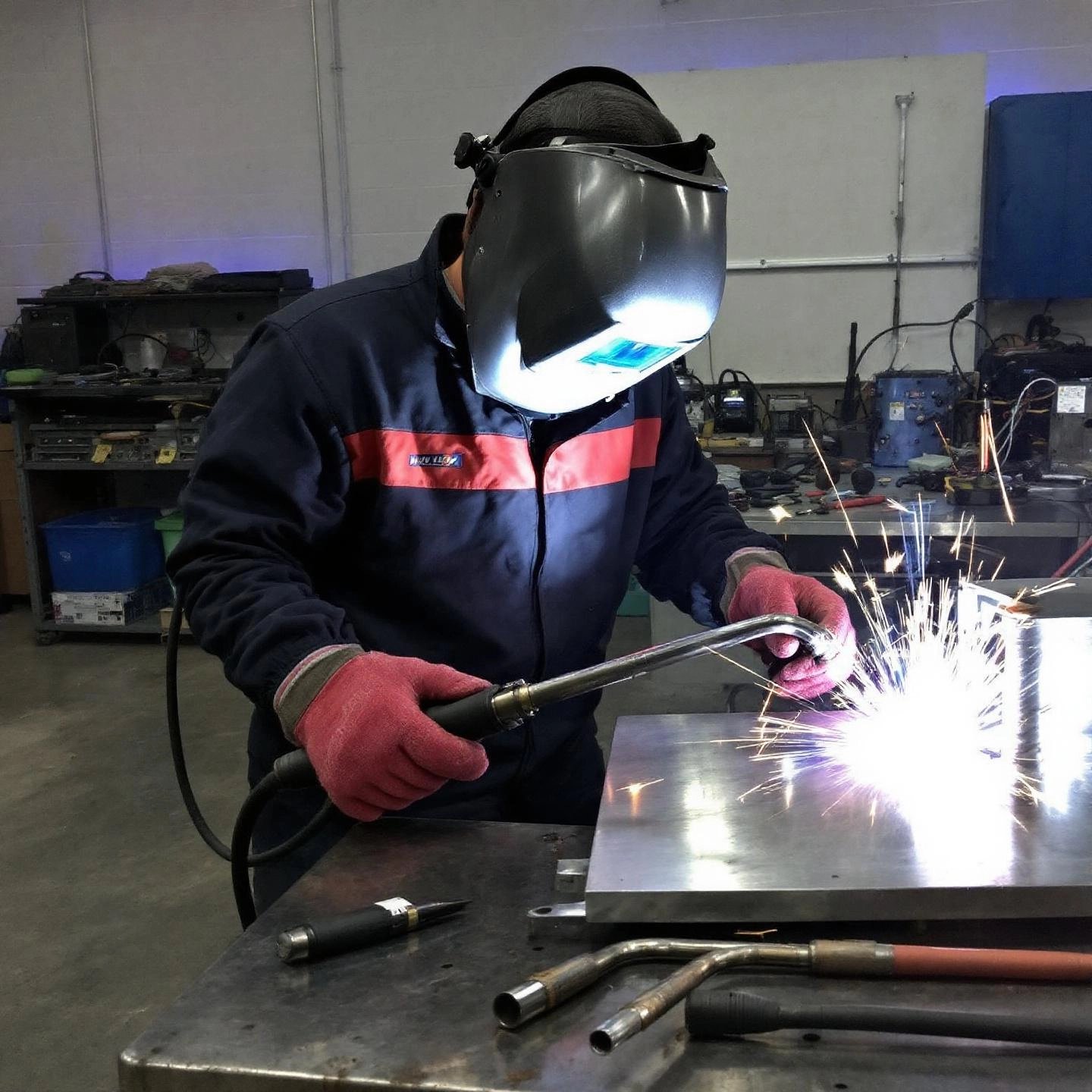
Have you ever found yourself searching for "aluminum welding near me" because a crucial part on your boat, car, or equipment needs expert attention? If so, you're not alone. Aluminum is everywhere—from the sleek body panels of modern vehicles to the sturdy hulls of boats and even in high-performance industrial machinery. But while it's a go-to material for many projects, finding the right welder for aluminum can be more challenging than you might expect.
So, what makes aluminum such a popular choice—and why does it require specialized care when it comes to welding?
However, if you’ve ever tried to weld aluminum—or even just watched someone attempt it—you’ll notice it’s not as straightforward as welding steel. Aluminum is soft, forms a tough oxide layer, and is highly sensitive to heat. This means a welder needs both the right tools and a deep understanding of the material to produce strong, safe, and visually appealing results (UTI).
Imagine you need a cracked aluminum wheel repaired, a custom bracket for your car, or a leak fixed on your boat’s hull. Not every "aluminum welding shop near me" is equipped to handle these jobs with the required expertise. That’s why this guide is here—to help you navigate the process of finding skilled local professionals, understanding the different types of aluminum repairs (from automotive to marine), and exploring the unique benefits of mobile welders who can come directly to your site.
But we won’t stop there. If you’re interested in learning the trade yourself or considering a career in welding, we’ll also cover local training options and what it takes to become a sought-after aluminum welder. Whether you’re a DIY enthusiast, a business owner, or simply someone facing an urgent repair, this comprehensive guide will help you make informed decisions every step of the way.
Ready to discover how to get the best results when searching for aluminum welding near you? Let’s dive in!
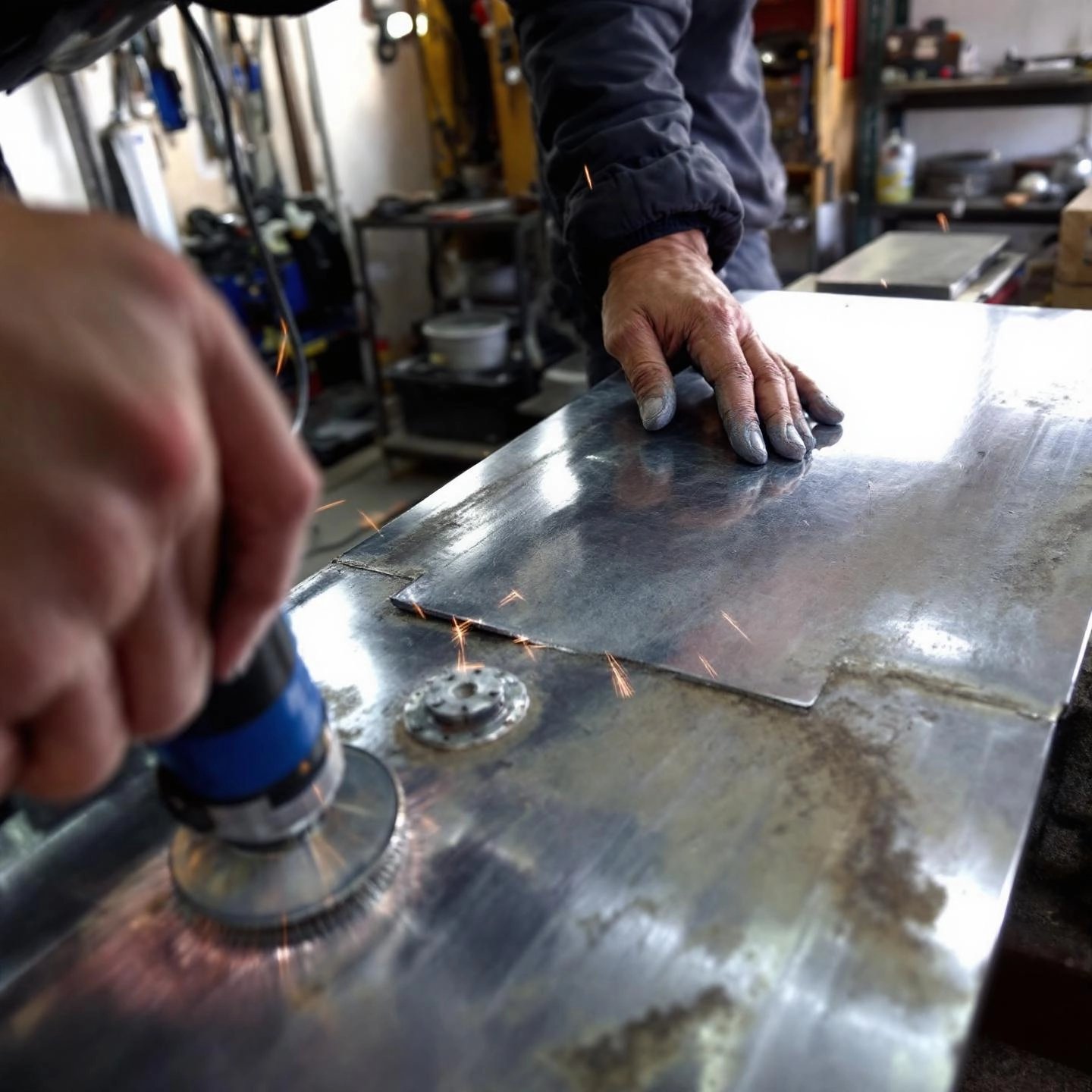
Ever wondered why searching for an “aluminum welder near me” is different than looking for someone to weld steel? If you’ve ever watched a seasoned welder handle aluminum, you’ll notice the process looks deceptively simple—but beneath the surface, it’s a whole different ballgame. Let’s break down what makes aluminum welding so unique and why it’s crucial to trust only experienced professionals with your project.
Aluminum’s popularity in automotive, marine, and manufacturing industries comes from its lightweight strength and resistance to corrosion. However, these same qualities introduce a set of technical hurdles that demand both skill and specialized equipment. Here’s what you need to know:
| Challenge | Why It Matters | Professional Solution |
|---|---|---|
| Oxidation | Prevents proper fusion, weakens weld | Mechanical/chemical cleaning, AC TIG for oxide removal |
| Heat Sink Effect | Hard to maintain weld pool, risk of incomplete fusion or burn-through | Precise heat control, hot-start features, experienced technique |
| Porosity | Creates weak welds prone to failure | Meticulous cleaning, use of shielding gas, proper storage |
| Material Softness | Wire feeding issues, inconsistent welds | Specialized feeders, U-groove drive rolls, dedicated liners |
Imagine you’re repairing a cracked aluminum wheel or a boat hull. Even a small mistake—like failing to remove the oxide layer or using the wrong machine settings—can lead to a weak joint or a failed repair. That’s why skilled welders invest in ongoing training and use equipment specifically designed for aluminum’s quirks. From selecting the right filler alloys to mastering advanced welding machines with hot start and crater fill features, every detail counts.
In short, aluminum welding isn’t just about joining two pieces of metal—it’s a technical craft that requires deep knowledge, the right tools, and a commitment to quality. When you’re searching for an “aluminum welder near me,” remember that expertise makes all the difference. Up next, we’ll show you exactly how to find and evaluate a reputable local aluminum welding shop, so you can trust your project is in the best hands.
When you need a critical repair or a custom aluminum project, finding the right professional isn’t just about convenience—it’s about safety, quality, and peace of mind. But with so many options popping up when you search for an “aluminum welding shop near me,” how do you separate the true experts from the rest? Let’s break down a step-by-step approach to ensure you’re choosing the best aluminum welding near you.
Imagine your car’s aluminum wheel has cracked or your boat’s hull needs urgent attention. Your first instinct might be to type “aluminum welding shop near me” into your favorite search engine. But don’t stop there. Here’s how to dig deeper:
Once you have a shortlist, it’s time to evaluate each candidate. Not all welders have the specialized training or equipment needed for aluminum—so a little homework goes a long way.
| Step | What to Ask or Do |
|---|---|
| Request a Quote | Ask for detailed pricing, including materials, labor, and any extra charges. |
| Check Insurance | Ensure the welder or shop carries liability insurance to protect your property. |
| Ask About Warranty | Find out if they guarantee their work and for how long. Reputable shops often stand behind their repairs. |
| Review Past Projects | Request before-and-after photos or references from similar jobs. This gives you a sense of their workmanship. |
Choosing the best aluminum welding near me isn’t just about who’s closest—it's about who’s qualified. By following these steps and using the checklist above, you’ll have the confidence to select a professional who can handle your project with precision and care. Next, we’ll explore how mobile aluminum welders bring even greater convenience for those jobs that can’t be moved to the shop.
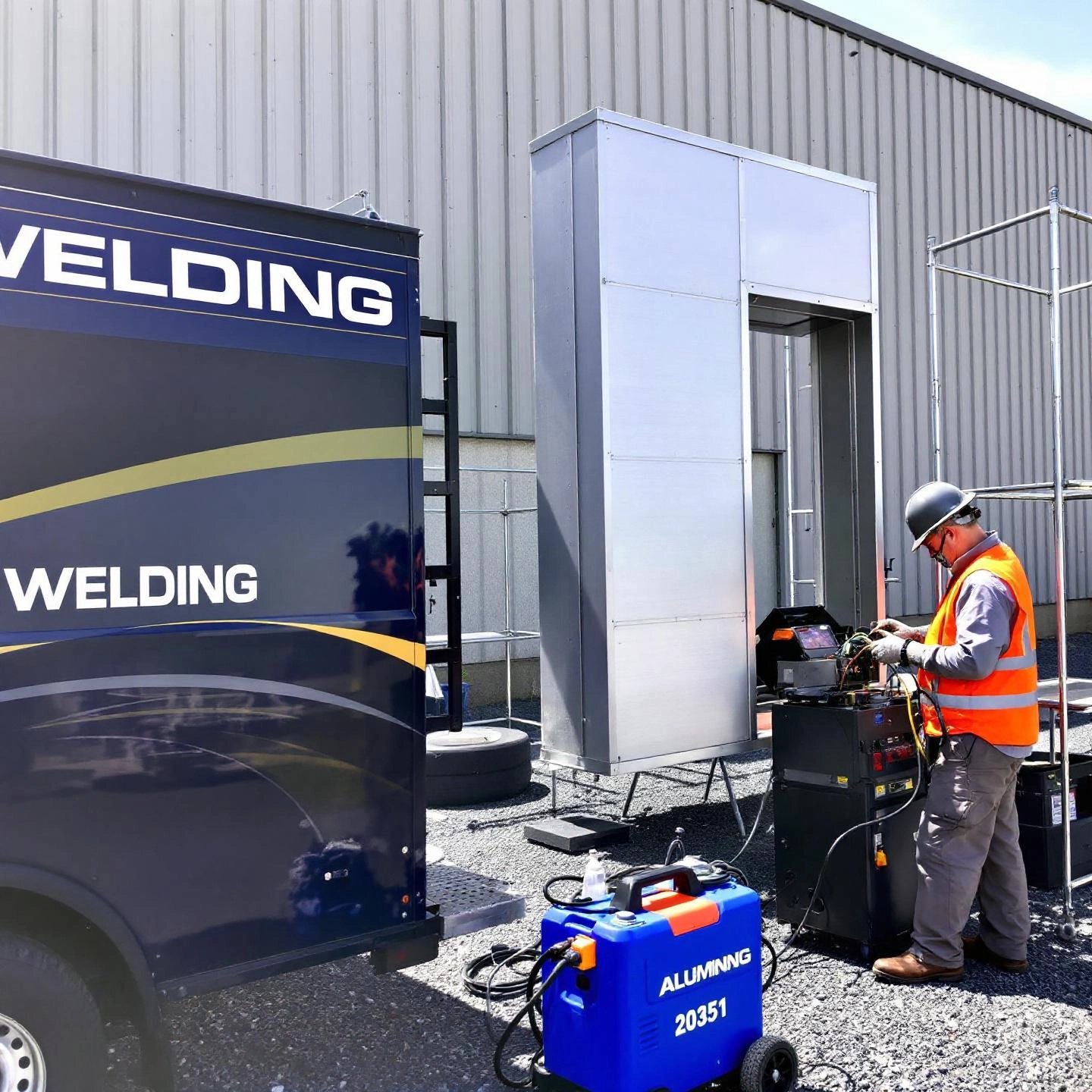
Ever wondered what happens when you can’t haul a heavy machine, a boat hull, or a structural frame to a welding shop? That’s where searching for mobile aluminum welding near me becomes a game-changer. Imagine a skilled welder pulling up to your location, fully equipped and ready to tackle repairs or fabrication right on the spot—no transportation headaches, no downtime, and no risk of damaging your project in transit. Sounds complex? In reality, it’s one of the most efficient solutions for modern repair and fabrication needs.
When you’re dealing with immovable or oversized items, mobile welding services offer a level of convenience that traditional shops simply can’t match. Here’s why more homeowners, businesses, and industry professionals are turning to on-site welders:
Wondering if your project is a good fit for mobile service? Here are some typical situations where on-site welding is the ideal choice:
Not sure what happens when you book a mobile aluminum welding service? Here’s a quick overview of what you can expect:
To get the best outcome, consider these tips before hiring a mobile aluminum welder:
Mobile aluminum welding near me isn’t just about convenience—it’s about getting expert service where and when you need it most. Whether you’re facing an urgent repair or planning a custom project, on-site welders provide the flexibility and professionalism to deliver quality results. Up next, we’ll dive into the specific repairs and benefits for automotive aluminum parts, so you know exactly what to expect when your wheels, radiators, or fuel tanks need expert attention.
When your car’s performance or safety is on the line, would you trust just anyone to fix a cracked wheel or a leaking radiator? With more vehicles relying on aluminum parts for strength and weight savings, the need for expert repairs is greater than ever. If you’ve ever typed “aluminum wheel welding near me” or “aluminum radiator welding near me” into a search bar, you already know how important it is to find a welder who truly understands the unique challenges of automotive aluminum repair.
Aluminum isn’t just for luxury or high-performance vehicles anymore. Thanks to industry-wide fuel economy regulations, automakers are using aluminum for everything from wheels and radiators to intercoolers and fuel tanks. But what happens when these critical parts get damaged?
Is it better to repair or replace a damaged aluminum part? The answer depends on the type and severity of the damage, the part’s function, and your budget. Here’s a quick breakdown to help you decide:
| Repair | Replacement |
|---|---|
| Cost-effective for minor cracks, leaks, or bends | Recommended for extensive structural damage, safety-critical failures, or when OEM procedures dictate |
| Faster turnaround (especially with mobile welders) | May be necessary if repair could compromise safety or performance |
| Preserves original fit and finish | Ensures compliance with manufacturer specifications |
Always consult a professional for an assessment. For example, a cracked wheel might be safely welded if the damage is minor and away from stress points, but severe fractures or cracks on load-bearing areas often require full replacement for safety reasons.
Aluminum automotive repairs aren’t just about making things look good—they’re about restoring the strength and safety your vehicle was designed for. Here’s why choosing a welder with specific automotive experience is non-negotiable:
In summary, whether you’re dealing with a cracked wheel, a leaking radiator, or a damaged panel, the right welder can make all the difference. Always seek out professionals with proven automotive aluminum experience for repairs that keep you safe and your vehicle performing at its best. Next, we’ll look at how these same principles apply to marine aluminum repairs—where corrosion resistance and watertight integrity are even more critical.
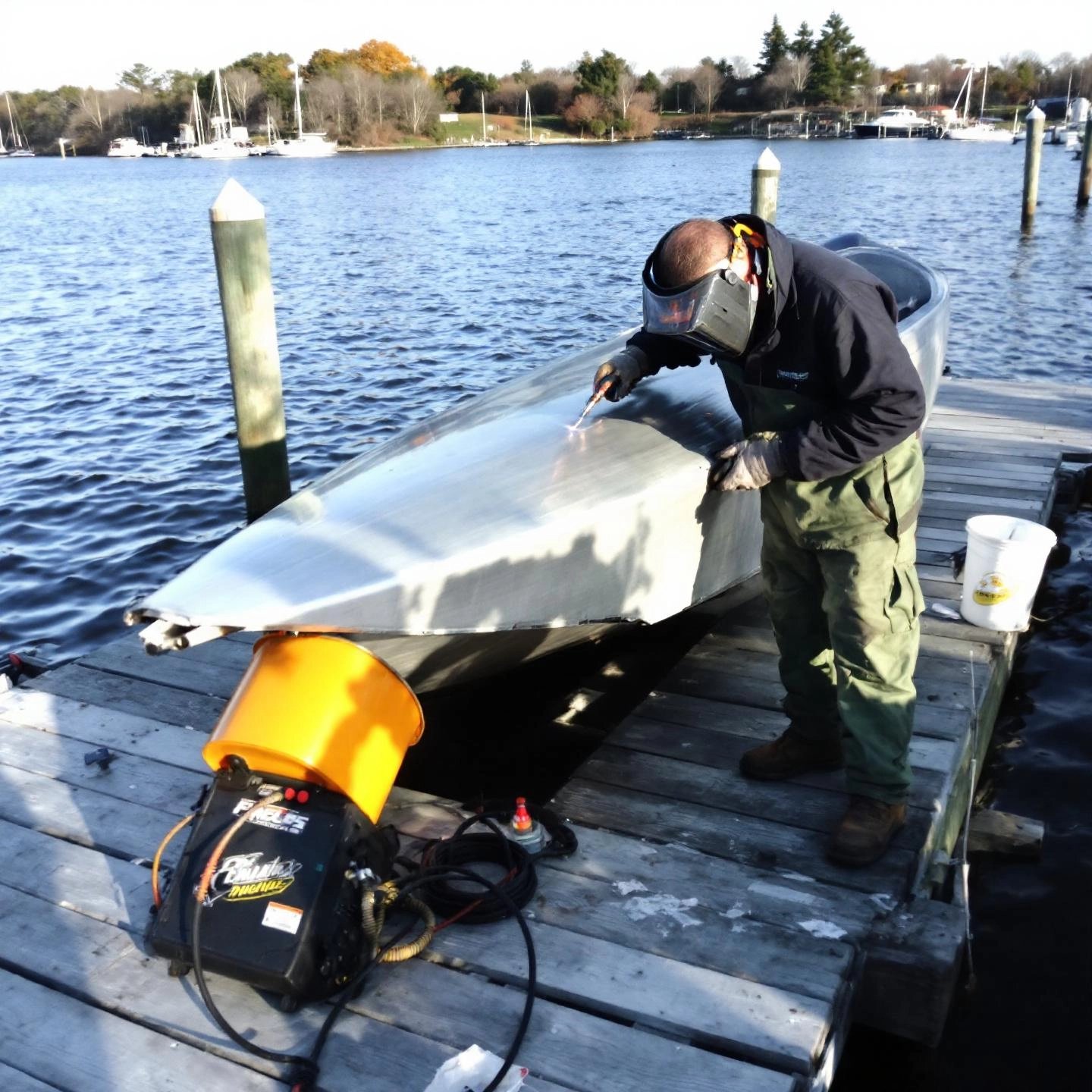
Ever noticed a crack in your boat’s hull or a leaky pontoon and wondered, “Where can I find reliable aluminum boat welding near me?” If so, you’re not alone. Marine aluminum repair is a specialized craft—one that demands both technical skill and an understanding of the harsh environments boats face. Let’s break down what makes marine welding unique, and how the right approach ensures your vessel stays safe and seaworthy for years to come.
Imagine your boat’s hull taking a hit from a submerged log or your pontoon developing a slow leak after years of use. Unlike automotive repairs, marine welding isn’t just about strength or appearance—it’s about withstanding constant exposure to water, especially saltwater, which can accelerate corrosion and weaken even the toughest metals. That’s why every weld, patch, or custom fabrication on a boat must be approached with extra care.
So, what makes a weld suitable for marine use? It starts with the right aluminum alloys and filler materials. Marine-grade aluminum—typically from the 5000 or 6000 series—is specifically formulated to resist corrosion, even after years of exposure to saltwater. But that’s only half the equation: the filler rod or wire used in the weld must also be marine-grade to prevent galvanic corrosion at the joint.
| Step | Purpose |
|---|---|
| Identify and mark crack ends | Prevents further spreading during repair |
| V-groove the crack | Ensures full weld penetration |
| Clean thoroughly (abrasive + solvent) | Removes oil, oxide, and contaminants |
| Use marine-grade filler alloy | Prevents corrosion and ensures compatibility |
| Weld with proper shielding gas | Protects against porosity and oxidation |
| Finish and inspect weld | Checks for leaks, cracks, and surface defects |
Whether you need a quick patch on a fishing boat or a full restoration of a pontoon, trusting your project to a welder who understands marine-grade materials and techniques is essential. The right repair not only restores strength and watertight integrity, but also extends the life of your investment—so you can spend more time on the water and less worrying about what’s happening below the surface.
Ready to keep your boat in top shape? Up next, we’ll explore why TIG welding is often the method of choice for those precise, clean aluminum welds—both on land and at sea.
Ever wondered why so many experts recommend searching for aluminum TIG welding near me when you need the cleanest, most precise welds? Imagine you’re restoring a classic car’s body panel, repairing a thin boat hull, or fabricating a decorative railing—jobs where every bead needs to be flawless and strong. In these cases, TIG (Tungsten Inert Gas) welding isn’t just a good choice; it’s often the only choice for top-tier results.
Sounds complex? Let’s break it down. TIG welding, also known as Gas Tungsten Arc Welding (GTAW), uses a non-consumable tungsten electrode to create the weld. Unlike MIG (Metal Inert Gas) welding, which feeds a continuous wire, TIG allows the welder to manually add filler material and precisely control the weld puddle. This hands-on approach is why TIG is favored for intricate work, thin materials, and applications where the weld’s appearance is as important as its strength.
While both TIG and MIG can weld aluminum, each has its strengths. MIG is faster and better suited for thicker materials or large production runs. But when your project demands meticulous attention to detail—think aerospace, marine repairs, or custom fabrication—TIG is the clear winner. Here’s a quick comparison to help you decide:
| Feature | TIG Welding | MIG Welding |
|---|---|---|
| Precision & Appearance | High—clean, detailed, minimal spatter | Moderate—more spatter, less control |
| Material Thickness | Best for thin to medium | Best for medium to thick |
| Speed | Slower, more deliberate | Faster, higher deposition rate |
| Skill Level | Requires advanced skill | Easier for beginners |
| Applications | Aerospace, marine, automotive, art | Structural, automotive, large-scale |
For example, if you’re searching for tig aluminum welding near me to repair a thin aluminum boat hull or fabricate a custom bracket, you’re prioritizing both appearance and structural integrity. TIG’s ability to produce defect-free, visually appealing welds makes it the go-to for jobs where quality simply can’t be compromised.
Even the best TIG welder can only do so much with subpar materials. That’s why professionals begin with premium aluminum profiles—free from impurities, consistent in alloy, and precisely extruded. When sourcing materials for critical projects, choosing a reputable supplier is as important as selecting the right welding process. For large-scale or industrial work, manufacturers like Shengxin Aluminum provide high-quality profiles that ensure your TIG welds are as strong and flawless as possible, right from the start.
In summary, TIG welding is the gold standard for aluminum when you need exacting results—whether for a show-quality car, a seaworthy boat, or a precision industrial part. If you’re considering a project that demands the very best, searching for a skilled TIG aluminum welding specialist near you is the smartest first step. Next, we’ll explore how mastering these advanced techniques can open doors to rewarding welding careers and specialized job opportunities in your area.
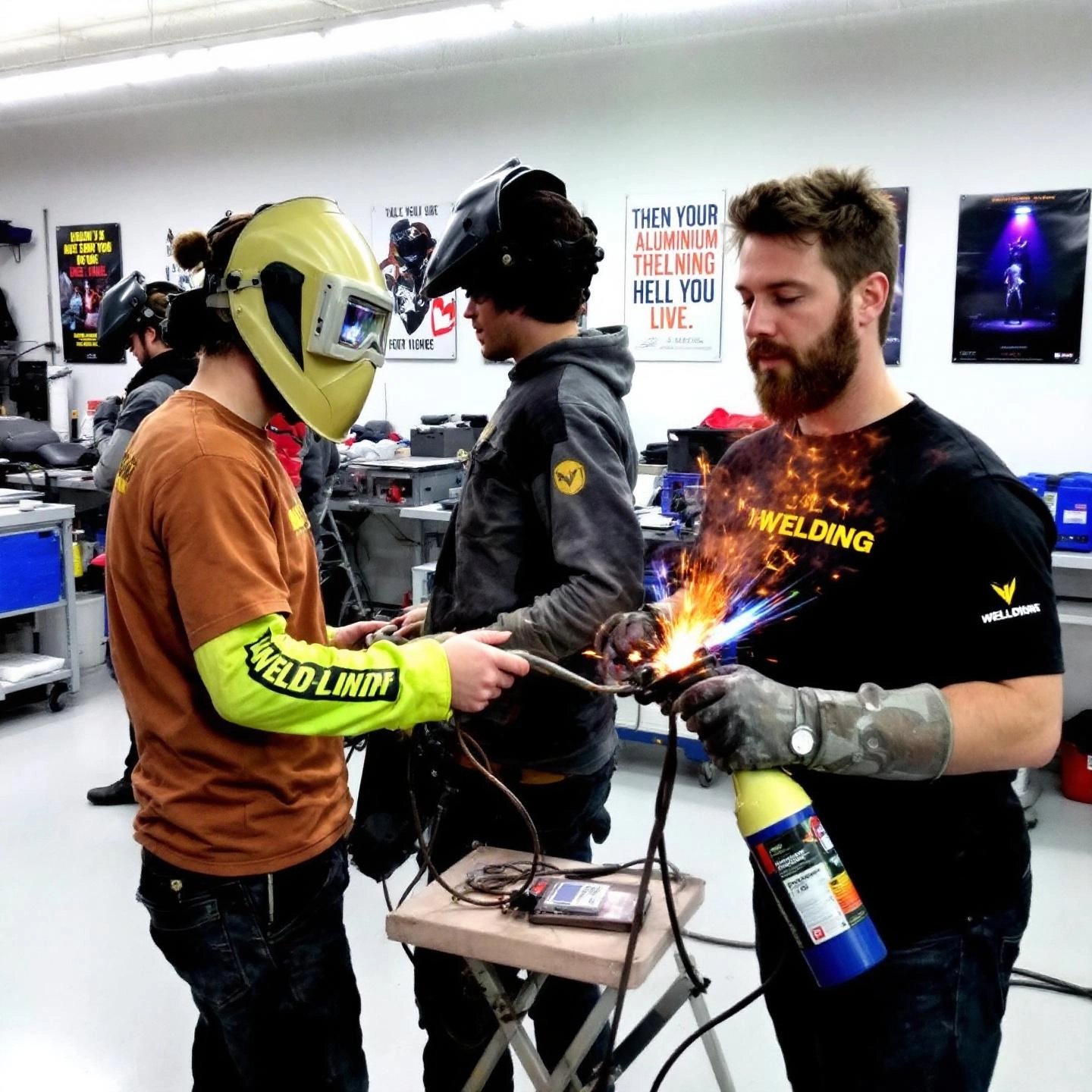
Ever wondered what it takes to turn your passion for hands-on work and problem-solving into a rewarding career? If you’ve ever searched for aluminum welding jobs near me or aluminum tig welding jobs near me, you’re tapping into a field with opportunities far beyond the typical repair shop. From aerospace hangars to shipyards, skilled aluminum welders are the backbone of innovation and industry.
Imagine building the next generation of electric vehicles, repairing commercial aircraft, or keeping massive ships seaworthy. Aluminum welders play critical roles in:
Sounds like a big leap? Here’s how you can prepare for competitive job placement in this field:
Not sure where you fit in? Here’s a snapshot of potential roles and how you can progress:
| Role | Typical Industry | Key Responsibilities |
|---|---|---|
| Entry-Level Welder | Automotive, Manufacturing | Basic welding, assembly, and repair tasks |
| TIG Aluminum Welder | Aerospace, Marine | Precision welding, quality control, complex fabrications |
| Welding Technician/Inspector | Construction, Shipbuilding | Testing welds, ensuring standards, troubleshooting |
| Project Manager or Supervisor | Large-scale Industrial, Rail | Overseeing teams, planning, and project delivery |
As you gain experience, you can move from hands-on roles to supervisory, inspection, or even teaching positions. Some welders specialize further, becoming experts in underwater welding, pressure vessel fabrication, or advanced robotic welding systems.
While many start their careers in local shops or on job sites, the most advanced opportunities often come from major manufacturers. Companies like Shengxin Aluminum offer skilled welders the chance to work on high-profile projects—think rail transit systems, new energy vehicles, or large-scale industrial fabrication. These roles may involve using state-of-the-art equipment, collaborating with engineers, and contributing to innovations that shape industries worldwide.
Whether you’re just starting out or looking to level up, the world of aluminum welding is full of possibilities. With the right training, certifications, and a commitment to quality, you can build a career that’s both stable and exciting—right in your local area or on a global stage. Next, we’ll guide you through the training classes and resources available to help you break into this dynamic field.
Curious about picking up the torch and learning to weld aluminum yourself? Maybe you’ve searched for “aluminum welding classes near me” after watching a professional at work or wondered if you could repair that cracked bracket or build your own custom projects. Good news: with the right resources and a little determination, you can gain the skills needed to tackle aluminum welding safely and effectively.
When you’re ready to dive in, you’ll find a surprising number of options for hands-on training. Community colleges, vocational schools, and dedicated craft centers regularly offer beginner-friendly welding courses. For example, organizations like The Crucible provide a range of classes—some focused specifically on aluminum and others that let you sample different welding types, including TIG and MIG. Many schools even offer short “taster” workshops, perfect if you want to try welding before committing to a full course.
Welding aluminum is different from working with steel, so beginner courses are designed to build a solid foundation. Here’s what you’ll typically cover:
Ready to practice at home or set up your own workshop? Here’s a checklist of essential gear for beginner aluminum welders:
| Equipment | Purpose | Where to Find |
|---|---|---|
| Welding Machine (TIG/MIG) | Main tool for joining aluminum | Local welding supply stores, online retailers |
| Protective Gear (helmet, gloves, jacket) | Essential for safety and comfort | Welding shops, hardware stores |
| Aluminum Welding Rods or Wire | Filler material for TIG/MIG | Search “aluminum welding rods near me” for local suppliers |
| Stainless Steel Brush | Cleaning aluminum before welding | Hardware stores, welding supply outlets |
| Shielding Gas (Argon) | Protects the weld from contamination | Gas suppliers, welding distributors |
Most beginner classes will provide all necessary equipment for in-class use, but if you’re planning to continue welding at home, your instructor can recommend trusted local suppliers for machines, rods, and safety gear.
By exploring “aluminum welding classes near me,” you’re opening the door to a valuable hands-on skill—whether for DIY repairs, creative projects, or even launching a new career. Once you’re comfortable with the basics, you’ll be ready to tackle more advanced techniques and, who knows, maybe even join the ranks of professional aluminum welders in your area. Next, we’ll wrap up with a summary of key takeaways and how to choose the right path—whether you’re seeking a local expert, mobile welder, or a training program to start your own journey.
When you first searched for aluminum welding near me, you might have expected a straightforward answer. But as you’ve discovered, aluminum welding is anything but simple. From the unique physical properties of aluminum to the specialized skills and tools required, every step—from finding the right local welder to choosing the best repair method—demands careful consideration. So, how do you ensure you’re making the smartest choice for your repair, fabrication, or career needs?
Imagine trusting a complex boat hull repair or a cracked automotive wheel to someone unfamiliar with aluminum’s quirks. The risks—weak joints, corrosion, or even safety hazards—are simply too great. As you’ve learned, aluminum’s oxide layer, high thermal conductivity, and susceptibility to porosity mean that only the most knowledgeable professionals can deliver strong, lasting results. That’s why it’s crucial to approach every project with a mindset that values expertise, certification, and attention to detail.
Ready to take action? Here’s a practical checklist to guide your decision-making:
| Step | What to Do |
|---|---|
| Identify Your Needs | Is it a quick repair, a custom fabrication, or a career move? |
| Vet Local Experts | Look for proven experience, proper certifications, and positive reviews. |
| Discuss Details | Ask about repair methods, materials, and warranty options. |
| Explore Training | Check out local classes or workshops if you want to DIY or go pro. |
| Source Quality Materials | For industrial or advanced projects, start with high-grade aluminum profiles from reputable manufacturers. |
For those tackling industrial-scale or high-performance projects, remember: even the best welder can only do so much with subpar materials. Sourcing premium aluminum profiles ensures your welds are strong, reliable, and built to last. Leading manufacturers like Shengxin Aluminum offer a range of high-quality profiles trusted by major industries—making them a smart choice for professional shops and ambitious DIYers alike.
“Aluminum welding is as much an art as it is a science. Whether you’re seeking the best aluminum welding near me or preparing to build your own skills, start with the right knowledge, the right professionals, and the right materials.”
Use this guide as your launchpad—whether you’re repairing, building, or learning, you’re now equipped to make informed decisions and achieve the results you deserve. The next time you need aluminum welding, you’ll know exactly where to turn, what to ask, and how to get the best outcome for your project, your career, and your peace of mind.
TIG welding is widely regarded as the top choice for aluminum due to its precision and ability to produce clean, strong welds. TIG is preferred for projects requiring detailed work, thin materials, or where appearance matters, such as automotive, marine, and custom fabrication jobs. MIG welding is also used for thicker sections or larger projects, but TIG offers superior control for most aluminum applications.
Not all welders are equipped to handle aluminum. While some stick or arc welders can technically join aluminum, they often lack the specialized equipment and techniques needed for quality, durable results. Professionals use TIG or MIG welders with specific settings and accessories for aluminum, ensuring strong, reliable welds and minimizing issues like porosity or weak joints.
Start by searching local directories, reading online reviews, and checking for certifications specific to aluminum welding. Ask potential welders about their experience with aluminum repairs, request to see previous projects, and confirm they use aluminum-specific equipment. For added convenience, consider mobile welding services that can handle repairs at your site.
Aluminum welding presents unique challenges, including a tough oxide layer that requires removal, high thermal conductivity that affects heat control, risk of porosity from contaminants, and the softness of aluminum wire. Skilled welders use specialized cleaning, equipment, and careful technique to overcome these issues and deliver safe, lasting repairs.
Yes, many community colleges and vocational schools offer aluminum welding classes covering safety, machine setup, and hands-on practice. Career opportunities exist in industries like automotive, aerospace, marine, and manufacturing, with advanced roles available at major manufacturers such as Shengxin Aluminum for those with specialized skills and certifications.
 Интернет Сервис
Интернет Сервис 0086 136 3563 2360
0086 136 3563 2360 sales@sxalu.com
sales@sxalu.com +86 136 3563 2360
+86 136 3563 2360